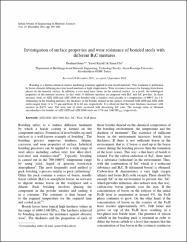Investigation of surface properties and wear resistance of borided steels with different B4C mixtures
Özet
Boriding is a thermo-chemical surface hardening treatment applied to iron based materials. This treatment is performed by boron element diffusing into iron based materials at high temperatures. Wear resistance increases by forming ferro-boron phases on the material surface. In addition, a very hard layer forms on the material surface. As a result, the tribological properties of the material increase. In this study, 6 different mixtures are prepared with B4C and SiC powders. In these mixtures steels of AISI 1020 and AISI 1040 are borided with a stainless steel crucible at a temperature of 900°C for 3 h. Depending on the boriding mixtures, the thickness of the borides formed on the surface of borided AISI 1020 and AISI 1040 steels ranged from 14 to 71 μm and from 10 to 64 μm, respectively. It is observed that the layer thickness increases with increase in B4C% ratio. The wear rate of steels increased with decreasing SiC ratio. The average value of obtained microhardness for borides of AISI 1020 and AISI 1040 steels are 1776 and 1860 HV0.05, respectively
(17) (PDF) Investigation of surface properties and wear resistance of borided steels with different B4C mixtures. Available from: https://www.researchgate.net/publication/286196539_Investigation_of_surface_properties_and_wear_resistance_of_borided_steels_with_different_B4C_mixtures [accessed Jan 12 2020].



















